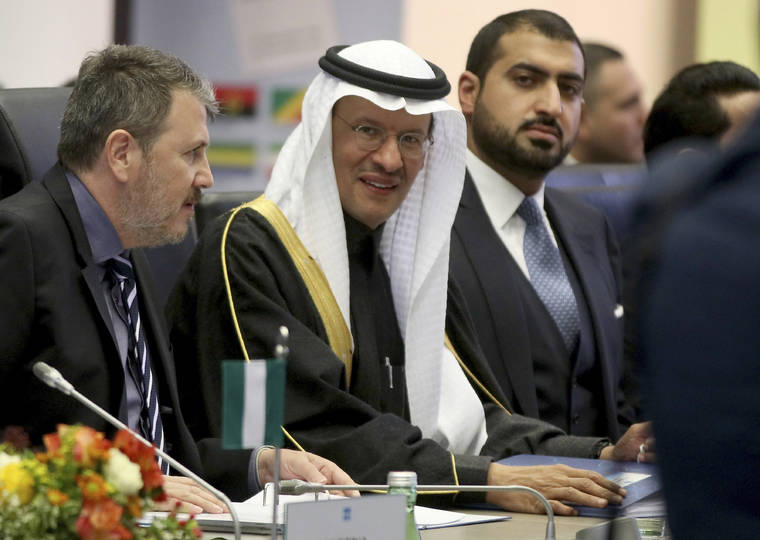VIENNA — The countries that make up the OPEC oil-producing cartel talked into the night Thursday over possible deep cuts to production that would support the price of fuel around the world.
An OPEC spokesman told waiting journalists at 10 p.m. (2100 GMT) that an expected news conference would not take place and that a written statement might come later.
The group was expected to prolong production cuts that they agreed on for the past three years, though Russia’s energy minister said even deeper cuts were under discussion. The price of crude has been capped in recent years by a resurgence in supplies from countries outside OPEC, particularly the United States.
As it stands, OPEC nations have agreed to cut production by 1.2 million barrels per day through March.
Russian Energy Minister Alexander Novak, whose country is not part of OPEC but joins part of the meeting to coordinate production, said Thursday that the group was discussing a further cut of 500,000 barrels a day “in order to safely go through the seasonal demand trough in the first quarter 2020.”
“Of course this is only a recommendation which will be made to the OPEC conference and to the ministerial meeting tomorrow, because those are the only two formations which can actually make a decision,” Novak said. “But they will be reviewing these recommendations.”
Saudi Aramco’s stock market debut put Saudi Arabia in a precarious position as it bets on what volume of oil production will hit a sweet spot for prices, with the added pressure of considering the interests of its shareholders. The nation is already bearing the burden of the largest share of OPEC’s production cuts.
But some nations such as Iraq have been ignoring the agreement and producing more than their allotted amount.
Analysts note that if countries are already not complying with the current agreement, voting for more cuts could be pointless.
“I think the Saudi position is they’re willing to cut more if needed, but they want better compliance,” said Bhushan Bahree, executive director of global oil at research group IHS Markit.
Outside the OPEC building, environmental activists held a small demonstration against the use of fossil fuels. The future of such carbon-intensive fuels is one of the key topics of a big United Nations meeting in Madrid on how to fight climate change.
Brent crude oil hovered near $63 per barrel Thursday. Prices have fluctuated throughout the year, reaching nearly $75 in April after U.S. sanctions on Iran and Venezuela limited world supply, but lingering trade tensions between the U.S. and China dampened economic expectations pushed prices back down.
West Texas Intermediate, the U.S. benchmark crude, was trading above $58.
Russia has indicated it wants its oil production re-calculated to exclude gas condensate, a liquid byproduct of natural gas production. Condensate is counted against production totals for non-OPEC members but not for members.
Even if members of the cartel cut production, there is more oil coming to market from non-OPEC nations, including the U.S., Canada, Brazil, Norway and Guyana, which will more than make up for any drop in production, according to IHS Markit.
———
Associated Press writer Kiyoko Metzler reported this story in Vienna and AP writer David McHugh reported from Frankfurt, Germany. AP Business Writer Cathy Bussewitz in New York contributed to this report.




